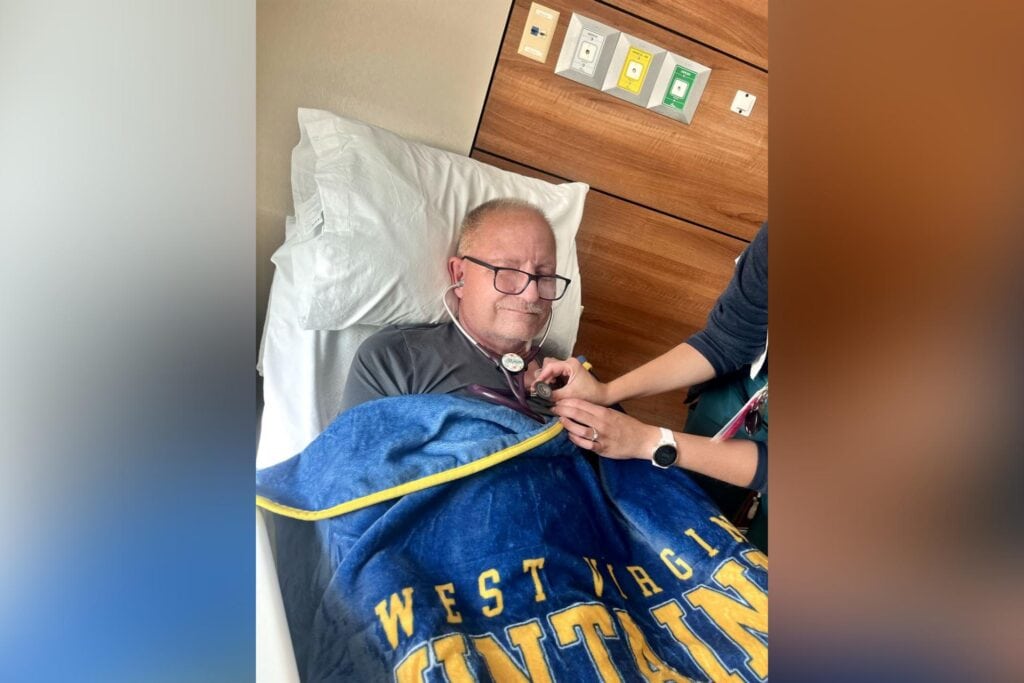John Mawyer didn’t know how much longer his heart would last. After multiple heart attacks, worsening chest pain, and a deteriorating quality of life, he feared he would eventually need a heart transplant. But when “eventually” came suddenly, he and his family turned to the experts at WVU Medicine, who seamlessly collaborated to save his life.
John suffered his first heart attack at age 32. Over the next 28 years, he endured six more heart attacks, underwent a quintuple (five-vessel) bypass surgery, and had 17 stents placed in his heart. Despite these interventions, his severe chest pain persisted, and even short walks or a gust of wind would leave him breathless.
Still, he tried to convince himself he’d somehow get better.
“Maybe something miraculous will happen to give me more years,” Mawyer said. “But it was to the point where the quality of life had gone down to – you can’t say zero – but it was low.”
His wife, Monica, urged him to see his doctor, who ordered a heart catheterization. Mid-procedure, Mawyer suffered his eighth heart attack. The cardiologist informed the family that he was in heart failure and would need a heart transplant.
Mawyer’s daughter, Madison, who works as a provider credentialing and onboarding coordinator at WVU Medicine, immediately reached out to George Sokos, D.O., chair of Cardiology and director of the Advanced Heart Failure Program. After learning the details, Dr. Sokos agreed to take on Mawyer’s case.
“After reviewing how serious John’s heart failure had become and talking through everything with him and his daughter, it was clear he needed to be considered for advanced therapies, possibly even a heart transplant,” Sokos said.
“With the complexity of his condition and how quickly things were progressing, we knew the best place for him to get the care he needed was at the WVU Heart and Vascular Institute, where he could be fully evaluated by our Advanced Heart Failure team and have access to life-saving options that aren’t available at most hospitals. It was the right move for John, and he received the specialized care that ultimately gave him a second chance.”
Upon Mawyer’s arrival to Ruby Memorial Hospital, the Advanced Heart Failure and WVU Medicine Transplant Alliance teams began evaluating him.
“We allocate hearts based off of medical urgency,” Christina Fagella, Mawyer’s pre- and post-transplant coordinator, explained. “Typically, the people that are sicker get organs faster and John was indeed very sick and need of support devices to keep him alive.”
Patients are assigned a medical urgency status based on criteria like dependence on mechanical support devices, heart rhythm issues, or complications from infection or clotting. While wait times vary, those in the most urgent categories can receive a heart in a matter of days or weeks.
Within days of Mawyer’s initial assessment, he went into cardiogenic shock, a life-threatening state in which the heart can no longer pump enough blood to support the body. His kidneys and liver began to shut down.
To stabilize him, doctors implanted an artificial assist device in his heart, a temporary means of pumping blood to his body, and started him on dialysis. His transplant status was immediately elevated to the second-highest urgency level.
Mawyer remembers little from that time, though he recalls the emotional toll. He had stopped eating due to depression, and neither medical staff nor family could convince him to eat. That changed when Sokos visited during rounds. After asking everyone to step out, he told Mawyer candidly that if he wanted the best outcome and shortest recovery, he needed to eat and move every day.
That moment, Mawyer said, was his wake-up call, because he realized, “I am going to get on the other side of this.”
Just six days later, the Mawyers got the news that would change his life forever. Vinay Badhwar, M.D., executive chair of the WVU Heart and Vascular Institute and chair of the Department of Cardiovascular and Thoracic Surgery, informed him and his family that a donor was located and that he was going to perform the transplant.
Dr. Badhwar performed West Virginia’s first heart transplant on Nov. 2, 2019, and since that time, heart transplant has become a routine procedure at the WVU Heart and Vascular Institute.
“Mr. Mawyer’s case is an example of the power of seamless collaboration that is emblematic of WVU Medicine and the WVU Heart and Vascular Institute,” Dr. Badhwar said. “Our heart failure specialists, transplant coordinators, heart surgeons, nurses, and cardiac teams always come together across disciplines to provide access to the highest quality and advanced care possible. It is this teamwork that enabled our privilege to provide him with his new heart and his excellent outcome.”
Since his surgery, Mawyer has been recovering steadily with cardiac rehabilitation and physical therapy. He no longer needs dialysis and is strong enough to care for himself. He takes anti-rejection medication and attends regular follow-up appointments with the WVU Transplant Alliance, both of which will be lifelong routines.
The experience has given the Mawyers a deep appreciation for organ donation. Most of the family are now registered donors.
“I’m just grateful for being put in a position to continue on with life,” Mawyer said.
“I’m blessed that I have my dad a lot longer now,” Madison Mawyer added. “He’s one of my best friends.”
The family praised the entire WVU Medicine care team, from nurses to pharmacists, as Mawyer described the coordination and commitment that got him through as “a miracle.”
“From the moment we saw the first person when he got there, to the people we see in all our follow-ups, and in between, I’ve never seen a group of doctors work as collaboratively as this team. This team was in stride the whole time and really did walk us through the entire process every step of the way,” Monica Mawyer said.
“And they didn’t just focus on John. They kept checking on all of us. Every person that we interacted with – they cared, and they made sure that everyone was taken care of.”
“This is the team that set the bar at all levels. It was the right decision for our entire family,” John Mawyer said. “I wouldn’t want to be anywhere else.”
For more information about the WVU Heart and Vascular Institute, visit WVUMedicine.org/Heart.
For more information about the WVU Medicine Transplant Alliance, visit WVUMedicine.org/Transplant. To register as an organ donor, visit RegisterMe.org/WVUMedicine.













